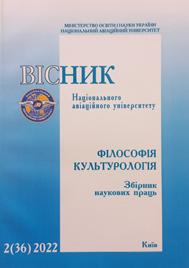GLOBALIZATION PROCESSES AND THE PROBLEM OF HUMAN EXISTENCE IN THE WORLD
DOI:
https://doi.org/10.18372/2412-2157.36.16975Keywords:
man, existence, world, globalization, process, philosophy, methodology, metaphysics, consciousness, modernity, transcendence, experiencesAbstract
Introduction. The article is devoted to the analysis of modern globalization processes, and their impact on the individual life. It is
emphasized that the beginning of the XXI-st century is characterized by the special attention of the world research literature to this
problem field. First, to the problem of the need for global changes in existing societies; secondly, about the need to develop new
methodological approaches to the problems of human life, existence and time; about the need for innovations in methodology and those
strategies that should become a kind of mirror for the extremely changing modern world. The aim of the articleis to reveal the new
meanings and contents brought by modern globalization processes to the consciousness of a person, to the peculiarities of his attitude
to himself, to other people, and to the world as a whole. Research methods. The main methodological principles for researching the
peculiarities of a person's semantic load, new orientations of his being in the context of globalization, is an interdisciplinary approach,
which allows highlighting essential changes in human psychology, his spiritual and value orientations, as well as in the attitude to his
essence. The sociocultural approach reveals the specifics of experiencing and living as a human being in the new trends of the globalist
world. Research results. In connection with the events taking place in modern Ukraine, we cannot fix certain states of the social space,
they are changeable, and their spatial and temporal characteristics are constantly varying. Modernity is a certain moment of existence
subject to conscious shifts, it is about what can be done better. Modern processes also depend on the will that connects different
generations of the Ukrainian people. And the stronger this will is, the longer the modernity is, the greater the freedom is. Conventionally
speaking, the dimensions of modernity are the dimensions and contents of freedom. The attitude towards an individual, and his life at
certain times had a nihilistic character in the socio-cultural Ukrainian space. Discussion. The idea of "unifying the world" has existed for
many centuries as the only possible approach for all of humanity. Both negative and positive consequences of globalization processes
are outlined. The conclusion is that a person is metaphysically free, and empirically - one who obeys necessity. This approach was
typical of the philosophical views of many representatives of both the Western European tradition of philosophizing and the Slavic
spiritual and cultural renaissance at the turn of the XIX th and XX th centuries and the beginning of the XXI century.
References
Doise W., Moscovici S. Approche et evitement du deviant dans des groups de cohesion differnte. Bull.Psychol. 2009. Vol.23. P.522-525.
Durkheim E. L’education morale. Paris. 1998. P. 3-69. 3. Fromm E. Marx’s Concept of Man. N.Y. : Frederick Ungar Publishing, 2001. P. 1-85.
Heidegger M. Sein und Zeit. Tübingen : Max Niemeyer. 1986. P. 123-140.
Lifton R. Home from war. N.Y. 1993. P.12-89.
Trotter W. Instincts of the Herd in Peace and War. London : M&K, 1986. P.10-115.
Генрих Д. Свідоме життя. Дослідження співвідношення суб’єктивності та метафізики / пер. з нім. та післямова Віталія Терлецького. К. : Курс, 2006. 188 с. (Серія наукових перекладів «ZETEƩIƩ»).
Дротянко Л. Г. Трансформація людської природи в контексті системи «людина-природа». Вісник Національного авіаційного університету. Серія : Філософія. Культурологія. № 1 (35). К. : 2022. С. 5-10.
Кримський С. Б. Під сигнатурою Софії. К. : Вид. дім «Києво-Могилянська академія», 2008. 367 с.

